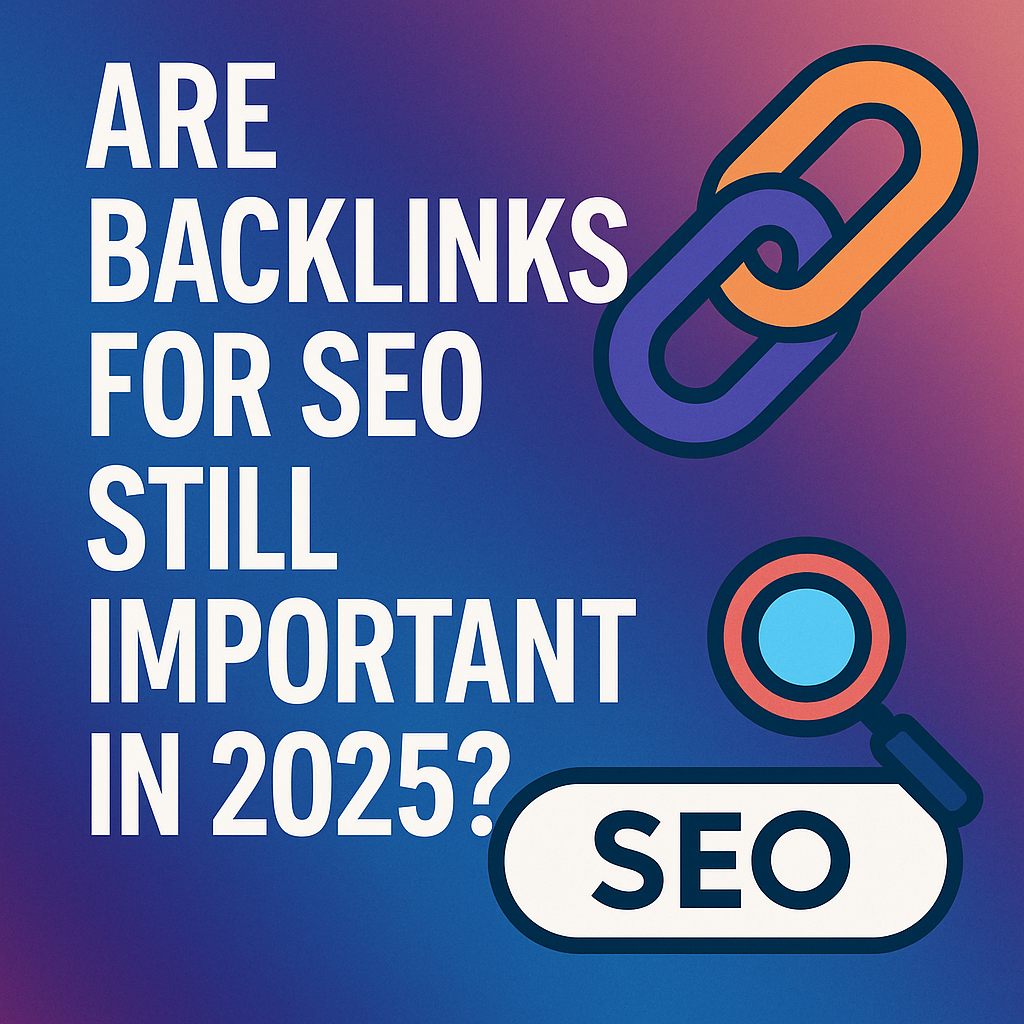Title:
ARE BACKLINKS STILL IMPORTANT FOR SEO IN 2025?
INTRODUCTION: ARE BACKLINKS STILL IMPORTANT FOR SEO IN 2025?
Search engine optimization (SEO) keeps changing every year, and 2025 is no different.
If you work on websites or content, you’ve probably wondered:
Are backlinks still important for SEO in 2025?
The simple answer is yes , they still matter, but not like they used to.
Gone are the days when just having a lot of links would boost your rankings.
Now, Google looks for quality, trust, and relevance in those backlinks.
In this post, we’ll explain how backlinks work today,
which ones really help, and how you can use them the smart way in 2025.

What Are Backlinks, and Why Did They Matter So Much?
A backlink is just a link from one website to another.
For example, if another website adds a link to your blog or page, that’s a backlink.
It’s like that site is saying, “Hey, this content is useful , go check it out!”
Search engines like Google take this as a positive sign.
They see backlinks as a way to measure how trustworthy and helpful your content is.
The more good-quality websites that link to you, the more Google trusts your page.
For many years, backlinks were one of the most important factors in SEO.
Websites with lots of backlinks , especially from trusted and popular sites ,
usually ranked higher in Google search results.
Because of this, backlinks became the foundation of most SEO strategies.
Everyone wanted more links to improve their rankings.
But today, things have started to change , and it’s all about quality over quantity.
How SEO Has Changed by 2025
SEO in 2025 is not the same as it was a few years ago , it has changed a lot.
Google’s systems have become much smarter, thanks to advanced AI tools like BERT, MUM, and SpamBrain.
These tools help Google better understand content and how people search online.
Now, it’s not just about having backlinks or stuffing in keywords.
Google focuses more on what users actually want and how helpful your content is.
Things like how fast your website loads, how it looks on mobile, and how easy it is to use really matter.
Metrics such as Core Web Vitals, page speed, and user engagement are key ranking factors.
If people quickly leave your site or find it hard to use, your rankings can drop.
Also, Google now punishes websites that try to cheat the system with spammy or fake backlinks.
So tricks and shortcuts no longer work , they can even harm your SEO.
In simple terms: SEO in 2025 is more about creating value for real people
and less about trying to outsmart search engines.
What Kind of Backlinks Are Valuable in 2025?
Not all backlinks are created equal. Here’s what makes a backlink truly valuable this year:
· Comes from a related website: If you have a health blog, getting a link from a fitness or nutrition site is great. But a link from an unrelated site, like a pet blog, won’t help much.
· Placed naturally in useful content: Backlinks that are part of a helpful article or blog post are more valuable than links placed in sidebars, footers, or random pages.
· Comes from different trusted websites: Google likes to see that you’re getting links from a mix of good, reliable sites , not just the same few linking over and over.
· Earned honestly: If you buy backlinks or join link exchange schemes, Google can catch it and penalize your site. It’s always better to earn links by creating helpful, shareable content.
Backlinks Are Just One Part of the Puzzle
In 2025, Google looks at many things , not just backlinks , to decide how to rank a website.
Here are some other important things that help your site show up in search results:
- Strong content on one topic: If you write deeply and clearly about a subject, Google and readers will trust your site more.
- How users behave on your site: If people leave your page quickly or don’t interact much, it can hurt your rankings — even if you have good backlinks.
- Internal linking: Linking your own pages together in a smart way helps Google understand your site better and boosts SEO.
- Structured data (Schema Markup): This is special code that tells Google what your content is about, helping it show your content more clearly in search results.
- Brand mentions: Even if another site doesn’t link to you, just mentioning your brand or website name still helps build your online reputation.
Smart Link-Building Strategies for 2025
So, what kind of backlinks actually help your website in 2025? Here’s what really works:
- Make useful content: Create helpful things like how-to guides, original research, useful tools, or interesting facts. People are more likely to link to content that gives value.
- Write guest posts wisely: Only write articles for websites that are related to your topic and are trusted by readers.
- Try HARO (Help a Reporter Out): You can share expert tips or quotes with journalists. In return, they may mention your name and link back to your website.
- Build real connections: Talk to other bloggers, writers, and influencers in your field. When you have good relationships, they’re more likely to link to your work.
And remember :- focus on helping people first, then think about SEO. Helpful content always wins in the long run.
Monitor and Maintain Your Backlinks
Here are some simple tools you can use to check and manage your website’s backlinks:
- Ahrefs : Shows which websites are linking to you, helps you find broken links, and lets you see what your competitors are doing.
- Semrush : Gives detailed reports on your backlinks, warns you about bad or risky links, and helps with link-building.
- Google Search Console : A free tool from Google that shows who is linking to your site and helps you spot problems.
It’s a good idea to check your backlinks every 3 to 6 months.
This way, you can remove bad links and try to fix or replace any links you’ve lost.
Conclusion
Yes, backlinks still matter in 2025, but not like they used to.
It’s no longer about collecting hundreds of links, it’s about getting the right ones from trusted and related websites.
But don’t stop at backlinks.
Google now cares more about how helpful your content is, how fast your site loads, and how users interact with your pages.
So, focus on helping your readers first; write great content, make your site easy to use, and let the backlinks come naturally.
Backlinks are still important, but today, value and trust win over tricks and shortcuts.

Frequently Asked Questions (FAQs)
1. Do backlinks still help with SEO in 2025?
Yes, backlinks still help, but they must come from trusted and relevant websites. Google now focuses more on quality, not just quantity.
2. How many backlinks do I need to rank higher?
There’s no exact number. A few high-quality backlinks from good websites are better than many weak or unrelated ones.
3. Can I still buy backlinks to boost my rankings?
No, buying backlinks is risky. Google can detect it and may penalize your site. It’s better to earn backlinks naturally by creating valuable content.
4. What type of backlinks work best in 2025?
Backlinks from related, trusted sites placed inside helpful and relevant content work best. Avoid links from spammy or unrelated websites.
5. Are there other things besides backlinks that affect SEO?
Yes! Google also looks at page speed, mobile-friendliness, helpful content, user experience, and how long people stay on your site.
6. How can I get good backlinks?
You can get backlinks by writing guest posts, creating high quality content, using tools like HARO, or building relationships with bloggers in your field.
7. Do I need SEO tools to check my backlinks?
Using tools like Ahrefs, Semrush, or Google Search Console helps you track and manage your backlinks — but even basic monitoring is a good start.
8. What happens if I have bad backlinks?
Too many bad or spammy backlinks can hurt your rankings. It’s important to review your link profile regularly and remove harmful links when needed.

